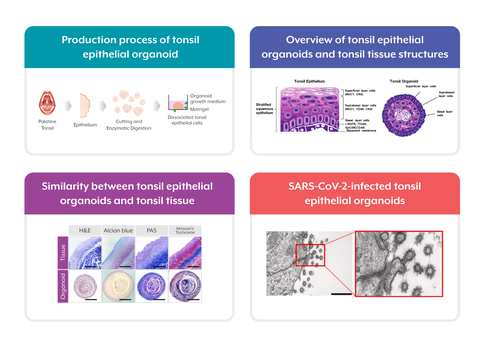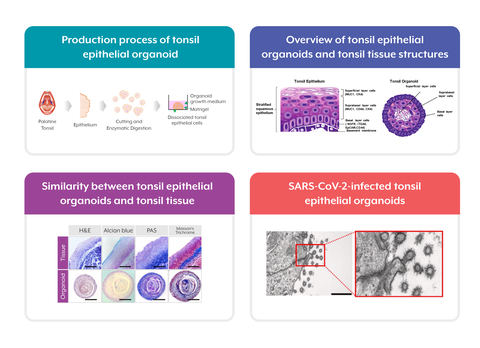PANGYO, South Korea--(BUSINESS WIRE)--Organoids, in vitro miniaturized model systems of organs, has been positioned as the most advanced scientific technology for understanding disease progress mechanisms and for discovering novel drugs. However, the generation of tonsil organoids with high reproducibility had remained a technical challenge due to the lack of their cultural system.
The research team led by Professor Jongman Yoo (Cha University and CEO of ORGANOIDSCIENCES) along with Professor Young-Chang Lim (Konkuk University) and Dr. Meehyein Kim (Korea Research Institute of Chemical Technology) successfully established tonsil epithelial cell-derived organoids and proved their feasibility as a 3D cultured infection model.
This is the first research outcome to the generation of tonsil epithelial organoids, which are structurally and genetically similar to human tonsil tissues, as well as to the scientific assessment of their suitability as an ex vivo model for SARS-CoV-2.
The team showed that the organoids elicit robust expression of transmembrane serine protease 2 (TMPRSS2) and furin, which are important for the maturation of spike proteins, and of the angiotensin-converting enzyme 2 (ACE2) cell surface receptor, which is essential for SARS-CoV-2 infection.
According to the journal, when Remdesivir, an antiviral drug, was applied to tonsil organoids infected with SARS-CoV-2, both viral RNA and protein levels were remarkably reduced. It is expected that the tonsil epithelial organoid could be utilized more extensively as an antiviral drug evaluation system for translational research, particularly against SARS-CoV-2 or its variants.
The results of this study demonstrated that the organoids are an attractive infection model for testing tissue susceptibility or transmissibility of diverse gastrointestinal or respiratory viruses. They provided insight into host defense mechanisms in terms of innate and adaptive immunity in which immunological interactions occur between tonsil epithelial cells, immune cells, and SARS-CoV-2.
The research team said, "Our discovery confirmative suggests that tonsil organoids can be one of the powerful platform technologies to find an antiviral drug against this pandemic virus. We hope our result can be connected to its applications in the research area of infectious diseases threatening public health such as COVID-19."
Full research ‘Generation of human tonsil epithelial organoids as an ex vivo model for SARS-CoV-2 infection’ in Biomaterials:
https://reader.elsevier.com/reader/sd/pii/S0142961222000990?token=3C50A0FF12B65F8D8E0AC6754139E7136771454E45D1F8FEF43AF4AD9B9D81A1FC956E27A56B6931E1F9B7F92B442BBF&originRegion=us-east-1&originCreation=20220404043530




